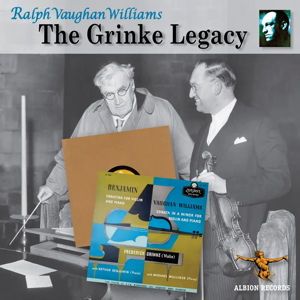
Ralph Vaughan Williams (1872-1958)
The Grinke Legacy
Concerto Accademico (Violin Concerto in D minor) (1925)
The Lark Ascending (1914/1920)
Two Hymn-Tune Preludes; No 1 Eventide (1936)
Violin Sonata in A minor (1954)
Arthur Benjamin (1893-1960)
Violin Sonatina (1924)
Frederick Grinke (violin)
Arthur Benjamin (piano), Michael Mullinar (piano)
Boyd Neel Orchestra/Louis Boyd Neel
rec. 1939-1940, except the Sonatas, 1955, London, UK
Albion Records ALBCD061 [72]
Frederick Grinke (1911-1987) was a steadfast interpreter of Vaughan Williams, first as leader of the Boyd Neel Orchestra in the 1930s and thereafter as a soloist. On those relatively few occasions when I have to play compare-and-contrast during reviews of the Violin Sonata, it’s to Grinke’s 1955 Decca recording that I invariably turn, and there have been times when I have used his 1940 recording of A Lark Ascending to contrast with more leisurely recent alternatives. Albion notes that everything in this latest release is making its first commercial digital release except for the Concerto Accademico.
I could have done with this CD when reviewing Szigeti’s 1955 recording of the Sonata (review) though the LP is certainly serviceable. That Szigeti performance must have been given around the time he gave the public première, but it was composed with Grinke in mind (and dedicated to him), who together with pianist Michael Mullinar spent a great deal of time going through the work with the composer. They gave the broadcast premiere in October 1954 and Szigeti gave the public première just over a year later – very adeptly in fact. However, the Grinke-Mullinar duo catches the drama and austerity of the writing perfectly, digging into the second movement’s furioso elements rather more bullishly than Szigeti, and ensuring that the brooding and resinous duality of the music is respected. The longest movement is the finale and it finds the duo fully in command of its occasionally puckish demands and the final The Lark Ascending reminiscences offer a beautiful culmination to a still-underappreciated work.
The Concerto Accademico (recorded in May 1939) is another fine vehicle for Grinke’s sweetly-focused tonal resources, its playful rhythmic writing being augmented by Neel’s astute direction. The fine wind playing in the central movement, allied to the soloists’ pliancy and tautness, are both highly effective, as is the neoclassical finale. The Lark Ascending (recorded in 1940) was its second recording, after Isolde Menges’ recording with Malcolm Sargent which has, by happy coincidence, also just been released on CD, also for the first time. As readers might have anticipated, performances of this work used to be very up-tempo. At 13 minutes this is only twenty seconds slower than Menges’ recording whereas now players can dawdle through it in up to 16. It possesses a lean, direct and unsentimental character that I find both charming and convincing though I’d certainly understand those who prize the Bean-Boult recording, as indeed do I. Incidentally, Boult disliked Grinke’s performance when he played it with the BBC and lobbied for Marie Wilson to play it. Grinke leads the orchestra for Eventide, one of the two Hymn-Tune Preludes.
The final work is Arthur Benjamin’s self-deprecatingly titled Violin Sonatina of 1924, a charming work that has received modern recordings from Lawrence Power and Simon Crawford-Phillips on Hyperion as well as from Lorraine McAslan and Sophia Rahman on Dutton. Grinke and the composer are just a touch quicker than the modern exponents without loss of drama, Benjamin ensuring that the music’s whimsical succulence comes across at forward-moving tempi. The Sonatina is at its most French in the finale, a little marvel of flair and sweeping elegance.
The documentation, as always with Albion, is exemplary. A small correction apropos very little; Marie Hall was not the first to record a truncated version of Elgar’s Concerto. Albert Sammons was.
The transfers are very clean-sounding, and side changes have been well managed, with pitch correction employed where necessary. I have to say that I find the transfers excessively scrubbed and that they lack air but I appear to be fighting a lost battle in that respect.
Otherwise, this is a splendidly conceived restoration.
Jonathan Woolf
Previous review: Stephen Greenbank (September 2024)
Buying this recording via a link below generates revenue for MWI, which helps the site remain free.



















